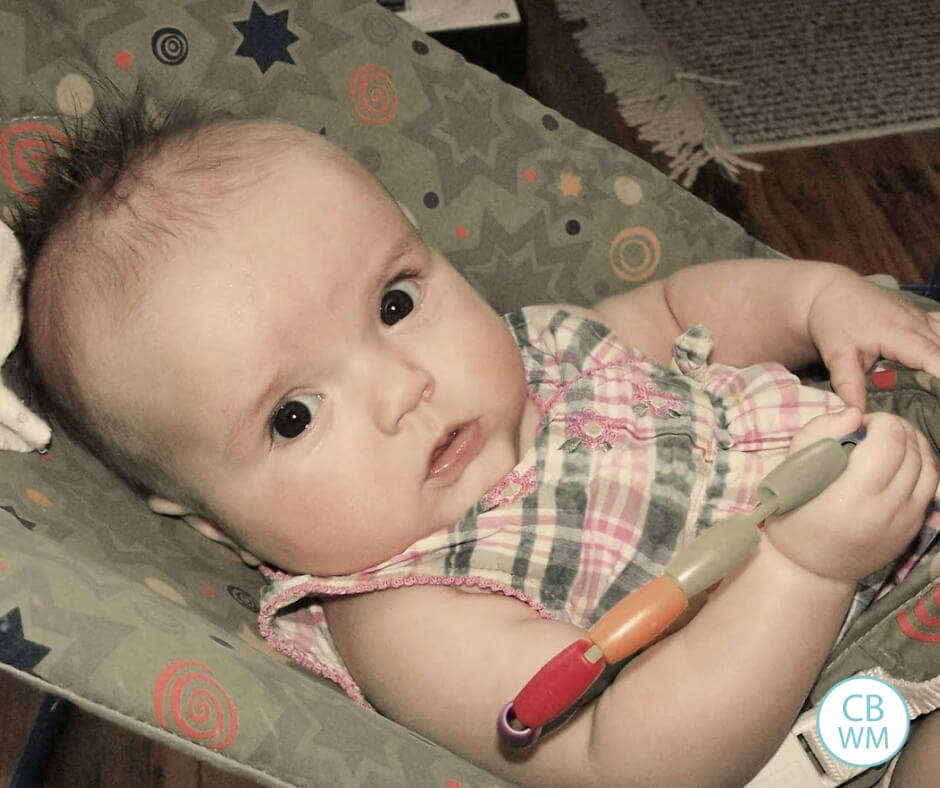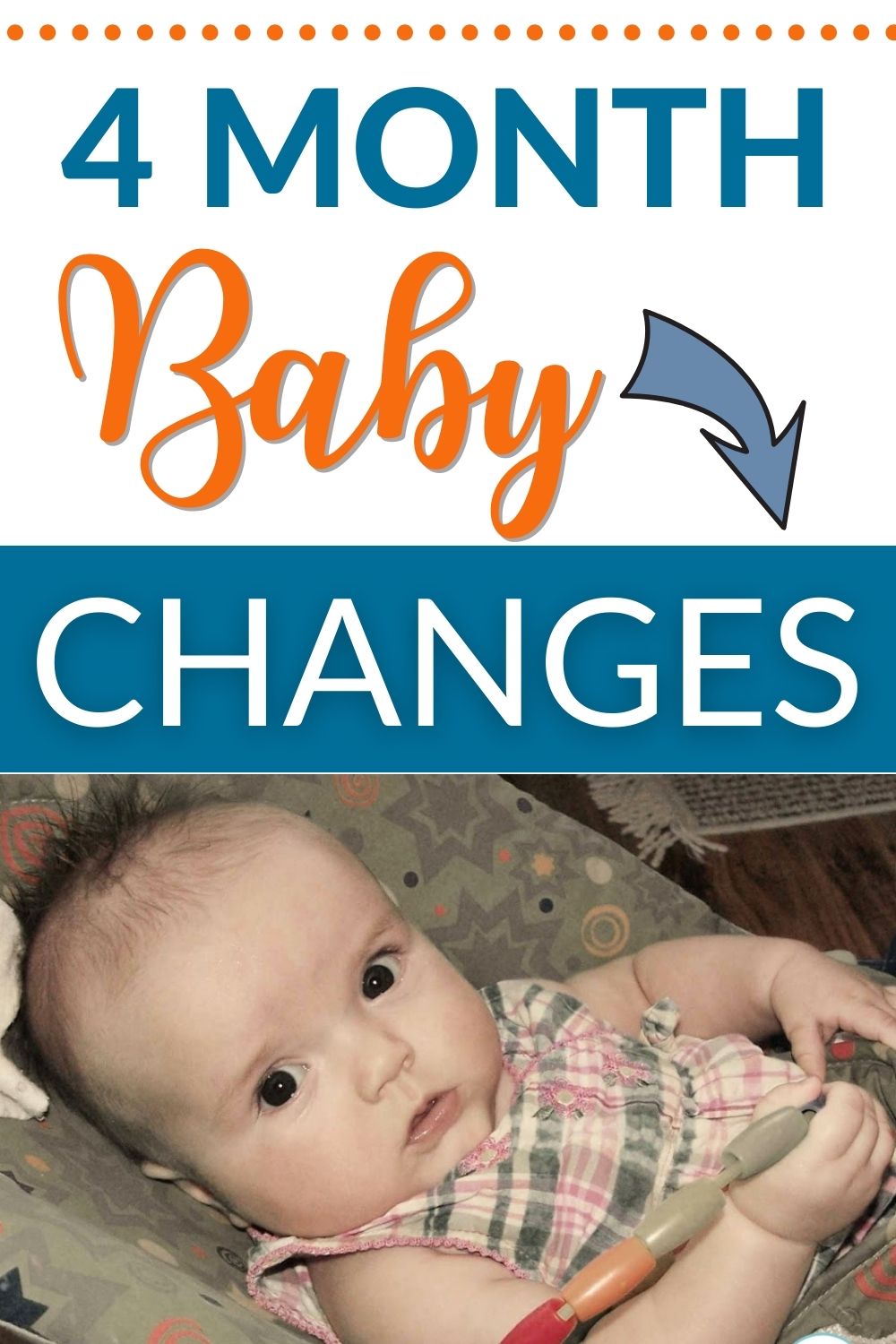Understand what is happening with your 4 month old baby and what the schedule should look like. There are many shifts in your baby at this age, which contribute to sleep issues and fussiness. Do you need to change your schedule? Is it a sleep regression? Is it a sickness or teething issue?

A large percentage of parents find four months old to be a difficult time period. For me, four months old was a “golden age” for both Brayden and Kaitlyn, but a fussy time for Brinley.
I have often wondered why so many parents find four months to be difficult. I mused over potential reasons in my earlier days of parenting (see 4 month sleep regression).
Over the years, I have learned that there are so many different changes and developmental milestones happening at 4 months old. We have a big wonder week and developmental leap. We have a sleep regression. Your baby might be starting solid foods. Your baby is learning new skills and changing rapidly.
Post Contents
Major Changes at 4 Months Old
While reading The Baby Whisperer Solves All Your Problems, Hogg lists many major changes that happen at four months of age (starting on page 33).
Hogg talks about how infants are now more aware of their environment and more interactive. They engages with toys and have a better memory. They are able to actually hold rattles and play with them.
They are more efficient eaters and nurse or finish a bottle much faster. Whether your baby is formula fed or breastfeeding, she will eat faster than she used to.
She can stay up longer than she could as a newborn. Wake windows need to increase as baby can handle longer stretches of awake time.
These are all things I have noticed (though both Brayden and Kaitlyn became much faster nursers around three months old rather than four months old). These are things that make four months really enjoyable for me.
There are other things Hogg talks about that I think can be contributors to common four month problems parents run into:
4 hour Schedule
Up to this point, your baby has probably been on a 2.5-3 hour routine. As your baby gets older, your baby’s sleep schedule and feeding schedules will need to adjust.
If your baby is struggling with fussiness or sleep issues, your baby might need to move to a four hour schedule and you aren’t realizing it. See four hour schedule tips here.
Early Morning Waking
Hogg says around this age many babies will wake around 5 AM. On Becoming Babywise also mentions this. Hogg suggests you not go into the room too fast when baby wakes up earlier than you expect. Your baby might settler herself back to sleep if given the chance.
There are more things you can do to help your baby sleep fully through the night and not just wake up at 5 AM. Read my post on 5-6 AM Night Wakings for more on that.
Longer Waketime (aka Wake Windows)
I listed this above, but if your baby needs a longer waketime and you are not recognizing that, you will have sleep problems.
You will also have sleep problems if you see baby needs a longer waketime and add too much.
When adding waketime, add very little at a time until you get to optimal. I personally added only 5 minutes at a time with Kaitlyn. That often was literally all she needed. I wouldn’t do more than 15 minutes at a time, but would actually stick closer to 10 if you think baby needs more than 5 additional minutes.
Because of my success in adding 5 minutes with Kaitlyn, that is all I added with my other girls, also.
See optimal waketime for guidance on figuring this out. I give full tips on how to find the waketime length as well as averages for waketime lengths.
Dropping the Dreamfeed
This isn’t listed by Hogg, but I thought I would add it. Your baby might be ready to drop the dreamfeed around this age. Often times, if you keep the dreamfeed around and baby doesn’t need it, it can interfere with restful sleep in the night. See: Dropping the “Dream Feed” for more on that.
Wonder Weeks and the 19 Week Wonder Week
This is not listed in the Baby Whisperer books, but it is a huge help in understanding 4 month old babies. The 19 week wonder week is another huge reason for sleep issues, grumpiness, fussiness, and other behaviors from your little one at this time. This is a huge time for cognitive change, and the Wonder Weeks book goes into that. Read all about Wonder Week 19 here.
What to Expect with a 4 Month Old
In your daily routine, here are some things ot expect with your 4 month old.
- Babies this age sleep 13.5-19.5 hours in a 24 hour period. The variance is because babies have individual sleep needs. The hours of sleep a baby will sleep in a day will vary.
- A 4 month old can start teething, so if your baby is fussy, check her gums.
- 4 month olds will move to 3 daytime naps.
- 4 month olds still need a bedtime routine and a nap routine.
- A 4 month old should have 4-6 feedings in a day. At 4 months, your baby should be eating 4-6 ounces at each feeding (if breastfeeding, just feed baby a full feeding).
- If you follow the vaccine schedule from the CDC, your 4 month old will get some vaccines at the well-child check this month. These include Rotavirus, diphtheria, tetanus, pertussis, haemophilus influenzae type b, pneumoccal conjugate, and polio. Vaccines can disrupt sleep and lead to baby being fussy for a time.

4 Month Old Baby Sample Schedules
It is really helpful to see sample schedules. You can see a big list of sample schedules used by real moms here: Babywise Sample Schedules: Four Months Old.
I also have summaries for my individual kids. I will link those here:
- McKenna Baby Summary: Week 18
- Brinley Summary: Week 18
- McKenna Baby Summary: Week 19
- Brinley Summary: Week 19
- McKenna Baby Summary: Week 20
- Brinley Summary: Week 20
- McKenna Baby Summary: Week 21
- Brinley Baby Summary: Week 21
- McKenna Baby Summary: Week 22
- Brinley Baby Summary: Week 22
Starting Solids
You might also start solids this month. Your baby might be fussy before you start solids because your baby is ready for that next step. On the flip side, your baby might be fussy after you start solids if the foods upset your baby’s tummy.
Before starting solid foods, make sur eyou check with your baby’s doctor.
Cereal is a good first food for your baby. Vegetables and fruits can also be good, but not every veggie or fruit is appropriate for a 4 month old.
>>>Read: How To Introduce Solid Foods to Your Baby
Conclusion
4 months old if a big time of change! If you are having schedule or sleep difficulties and your baby is close to four months old, look into these possible reasons.
Related Posts
- The Wonder Weeks and Sleep
- Baby’s 4 Month Sleep Regression: What To Do
- Best Toys for Baby: Ages 4-6 Months

This post first appeared on the blog in May 2009

